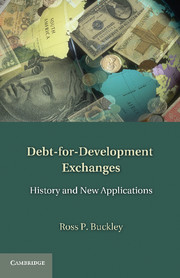Book contents
- Frontmatter
- Contents
- Acknowledgments
- List of Contributors
- Introduction: A Productive Partnership between Civil Society and the Academy
- Part I Types of Exchanges and Their Development over Time
- Part II Exchanges by Donor Countries
- Part III Critiques of Exchanges
- 10 Debt Audits: A Necessary Precondition to Credible Exchanges
- 11 How to Deal with Debt Illegitimacy in Relation to Debt Conversion: Reflections on an All-Too-Real Case
- 12 The Human Rights Dimension in Exchanges
- 13 Bangladesh's Experience with Exchanges: Liability to Potential
- 14 The Philippines' Experience with Exchanges
- Part IV Innovative Applications of Exchanges
- Conclusion
- Index
- References
13 - Bangladesh's Experience with Exchanges: Liability to Potential
Published online by Cambridge University Press: 01 June 2011
- Frontmatter
- Contents
- Acknowledgments
- List of Contributors
- Introduction: A Productive Partnership between Civil Society and the Academy
- Part I Types of Exchanges and Their Development over Time
- Part II Exchanges by Donor Countries
- Part III Critiques of Exchanges
- 10 Debt Audits: A Necessary Precondition to Credible Exchanges
- 11 How to Deal with Debt Illegitimacy in Relation to Debt Conversion: Reflections on an All-Too-Real Case
- 12 The Human Rights Dimension in Exchanges
- 13 Bangladesh's Experience with Exchanges: Liability to Potential
- 14 The Philippines' Experience with Exchanges
- Part IV Innovative Applications of Exchanges
- Conclusion
- Index
- References
Summary
INTRODUCTION
Bangladesh has long been considered a ‘test case’ for the International Financial Institutions' ‘economic medicine’ – the neoclassical development theories that basically nullify a country's sovereign development planning and implement World Bank–International Monetary Fund (IMF) reform theories. These economic reform theories, in fact, contribute to reinforcing a ‘rentier economy’ controlled by the national elites and international development brokers, and made the country largely dependent on foreign trade and the recycling of aid money.
Aside from the World Bank and IMF policies, the ‘aid consortium’ that was established by the aid agencies in 1974 imposed cross-conditionality on policy reform, progressively taking control of the public finances, supervision of fund allocation and setting of development priorities. All these mechanisms, combined with IMF–World Bank's policy-based lending under the structural adjustment program, created favoured ground for enlarging outstanding debt, which now amounts to US$23.6 billion, 21% of the country's gross domestic product (GDP). This gives rise to a debt servicing liability of US$2 billion in the 2010–2011 financial year, almost double the annual budgetary allocation to the health and agriculture sectors. The increasingly higher debt repayments represent an ‘outflow’ of potential resources that could be invested in essential services to reduce human poverty. Though cancellation of outstanding debt owed by Bangladesh would help the country to translate its debt-service ‘liabilities’ into development ‘potentials’, unfortunately Bangladesh has failed to qualify for ‘debt cancellation’ under the Highly Indebted Poor Country (HIPC) Initiative and the Multilateral Debt Relief Initiative (MDRI) of the World Bank and IMF.
- Type
- Chapter
- Information
- Debt-for-Development ExchangesHistory and New Applications, pp. 152 - 166Publisher: Cambridge University PressPrint publication year: 2011



